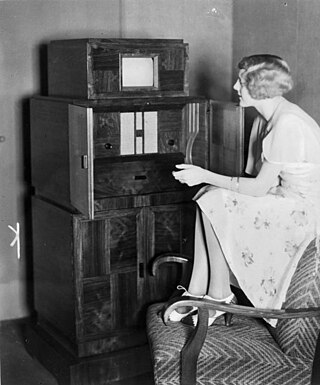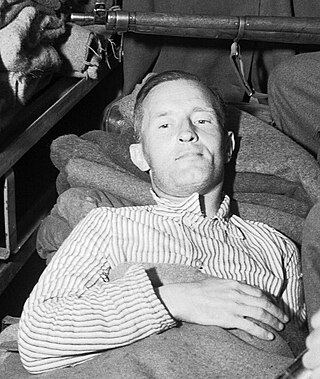
The BBC World Service is an international broadcaster owned and operated by the BBC. It is the world's largest external broadcaster in terms of reception area, language selection and audience reach. It broadcasts radio news, speech and discussions in more than 40 languages to many parts of the world on analogue and digital shortwave platforms, internet streaming, podcasting, satellite, DAB, FM, LW and MW relays. In 2024, the World Service reached an average of 450 million people a week. In November 2016, the BBC announced that it would start broadcasting in additional languages including Amharic and Igbo, in its biggest expansion since the 1940s.
International broadcasting consists of radio and television transmissions that purposefully cross international boundaries, often with then intent of allowing expatriates to remain in touch with their countries of origin as well as educate, inform, and influence residents of foreign countries. Content can range from overt propaganda and counterpropaganda to cultural content to news reports that reflect the point of view and concerns of the originating country or that seek to provide alternative information to that otherwise available as well as promote tourism and trade. In the first half of the twentieth century, international broadcasting was used by colonial empires as a means of connecting colonies with the metropole. When operated by governments or entities close to a government, international broadcasting can be a form of soft power. Less frequently, international broadcasting has been undertaken for commercial purposes by private broadcasters.

ARD is a joint organisation of Germany's regional public-service broadcasters. It was founded in 1950 in West Germany to represent the common interests of the new, decentralised, post-war broadcasting services – in particular the introduction of a joint television network.
Westdeutscher Rundfunk Köln, shortened to WDR, is a German public-broadcasting institution based in the Federal State of North Rhine-Westphalia with its main office in Cologne. WDR is a constituent member of the consortium of German public-broadcasting institutions, ARD. As well as contributing to the output of the national television channel Das Erste, WDR produces the regional television service WDR Fernsehen and six regional radio networks.

Norddeutscher Rundfunk, commonly shortened to NDR, is a public radio and television broadcaster, based in Hamburg. In addition to the city-state of Hamburg, NDR broadcasts for the German states of Lower Saxony, Mecklenburg-Vorpommern and Schleswig-Holstein. NDR is a member of the ARD organisation.
Charlie and his Orchestra were a Nazi-sponsored German propaganda swing band. Jazz music styles were seen by Nazi authorities as rebellious but, ironically, propaganda minister Joseph Goebbels conceived of using the style in shortwave radio broadcasts aimed initially at the United Kingdom, and later the United States, after the German declaration of war on 11 December 1941.
Radio 1212 or Sender 11212 or Nachtsender 1212 was a black propaganda radio station operated from 1944 to 1945 by the Psychological Warfare Branch of the US Office of War Information (OWI) under the direction of CBS radio chief William S. Paley, who was based in London. Nachtsender 1212 broadcast from the Grand Duchy of Luxembourg using the former commercial radio facilities known as Radio Luxembourg, which had been occupied and then liberated from German control during World War II.
Sender Freies Berlin was the ARD public radio and television service for Berlin from 1 June 1954 until 30 April 2003. On 1 January 1992, SFB became the public broadcaster for the whole of reunited Berlin. However, SFB had long had a significant audience in East Berlin for some time before German reunification. On 1 May 2003 it merged with Ostdeutscher Rundfunk Brandenburg to form Rundfunk Berlin-Brandenburg.

Nordwestdeutscher Rundfunk was the organization responsible for public broadcasting in the German Federal States of Hamburg, Lower Saxony, Schleswig-Holstein and North Rhine-Westphalia from 22 September 1945 to 31 December 1955. Until 1954, it was also responsible for broadcasting in West Berlin. NWDR was a founder member of the consortium of public-law broadcasting institutions of the Federal Republic of Germany, the ARD.
The year 1939 saw a number of significant events in radio broadcasting.
The year 1945 saw a number of significant happenings in radio broadcasting history.

The first regular electronic television service in Germany began in Berlin on March 22, 1935, as Deutscher Fernseh Rundfunk. Broadcasting from the Fernsehsender Paul Nipkow, it used a 180-line system, and was on air for 90 minutes, three times a week. Very few receivers were ever privately owned, and viewers went instead to Fernsehstuben. During the 1936 Summer Olympics, broadcasts, up to eight hours a day, took place in Berlin and Hamburg. The Nazis intended to use television as a medium for their propaganda once the number of television sets was increased, but television was able initially to reach only a small number of viewers, in contrast to radio. Despite many technical improvements to camera technology, allowing for higher resolution imaging, by 1939, and the start of World War II, plans for an expansion of television programming were soon changed in favor of radio. The production of the TV receiver E1, that had just started was cancelled because of the war. Nevertheless, the Berlin station, along with one in occupied Paris, remained on the air for most of World War II. A special magazine called Fernsehen und Tonfilm was published.
Wolf Müller-Mittler was a German radio host and journalist. He was one of the persons associated with the nickname Lord Haw-Haw during World War II, though he only recorded half a dozen propaganda sessions in 1939. He has been described by one author as "a blond Polish-German Anglophile playboy". After the war he worked for Bavarian Radio, translating foreign broadcasts and conducting interviews.
Radio propaganda is propaganda aimed at influencing attitudes towards a certain cause or position, delivered through radio broadcast. The power of radio propaganda came from its revolutionary nature. The radio, like later technological advances in the media, allowed information to be transmitted quickly and uniformly to vast populations. Internationally, the radio was an early and powerful recruiting tool for propaganda campaigns.
Leonard Banning was a British broadcaster of Nazi propaganda during World War II. In 1946, he was convicted of offences under the Defence Regulations and sentenced to 10 years' penal servitude. He was born in St Albans, Hertfordshire.

William Brooke Joyce, nicknamed Lord Haw-Haw, was an American-born fascist and Nazi propaganda broadcaster during the Second World War. After moving from New York to Ireland and subsequently to England, Joyce became a member of Oswald Mosley's British Union of Fascists (BUF) from 1932, before finally moving to Germany at the outset of the war where he took German citizenship in 1940.

Lord Haw-Haw was a nickname applied to William Joyce and several other people who broadcast Nazi propaganda to the United Kingdom from Germany during the Second World War. The broadcasts opened with "Germany calling, Germany calling," spoken in an affected upper-class English accent. The same nickname was also applied to some other broadcasters of English-language propaganda from Germany, but it is Joyce with whom the name is overwhelmingly identified.
This is a list of events from British radio in 1945.
This is a list of events from British radio in 1940.
This is a list of events from British radio in 1939.





